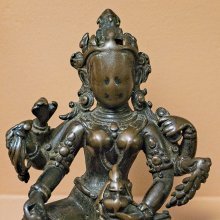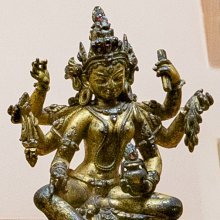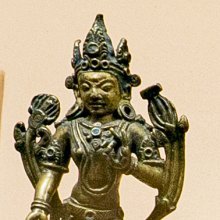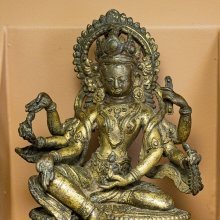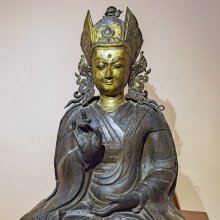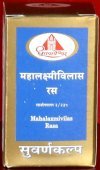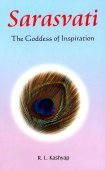Knowledge: 3 definitions
Introduction:
Knowledge means something in Hinduism, Sanskrit. If you want to know the exact meaning, history, etymology or English translation of this term then check out the descriptions on this page. Add your comment or reference to a book if you want to contribute to this summary article.
Images (photo gallery)
(+9 more images available)
In Hinduism
Ayurveda (science of life)
Source: INSA Digital Repository: Caraka’s Approach to KnowledgeKnowledge of life (Ayurveda) deals with the characteristics of life endowed by nature, which are eternal (Cf. Charaka Samhita verse 30.27).—Caraka recognised three primary urges in human life—the urge to live long, to earn a living and to secure a good afterlife (Charaka Samhita verse 11.3-6). About afterlife, he noted that there were doubts because it was not perceptible through our senses. This was the context in which he introduced the subject of accessing exact knowledge.
Charaka recognised at least four means of Knowledge:
- Knowledge gained through Testimony of Sages (Sanskrit: āptopadeśa),
- Knowledge gained through Perception (Sanskrit: pratyakṣa),
- Knowledge gained through Inference (Sanskrit: anumāna),
- Knowledge gained through Reason (Sanskrit: yukti).

Āyurveda (आयुर्वेद, ayurveda) is a branch of Indian science dealing with medicine, herbalism, taxology, anatomy, surgery, alchemy and related topics. Traditional practice of Āyurveda in ancient India dates back to at least the first millenium BC. Literature is commonly written in Sanskrit using various poetic metres.
Purana and Itihasa (epic history)
Source: Shodhganga: Elements of Art and Architecture in the Trtiyakhanda of the VisnudharmottarapuranaKnowledge (of various subjects) refers to several of the “sixty four kinds of Art”, according to the Kamasutra of Vatsyayana.—Cf. the Sanskrit Nāṭakākhyāyikādarśana.—Indian tradition, basically includes sixty four Art forms are acknowledged. The history of Indian Art covers approximately five thousand years which presents a rich and almost continuous record. The references of sixty four kinds of Kala (कला, kalā) are found in the Bhagavatapurana, Shaiva-Tantras, Kamasutra of Vatsyayana etc.
Knowledge of the following subjects were commonly counted among the list of Arts:
- Knowledge of dramas and stories.
- Knowledge about precious metals and stones.
- Knowledge of metals.
- Knowledge of jewel, colours and mines.
- Knowledge of foreign languages.
- Knowledge of etymology.
- Knowledge of lexicography.
- Knowledge of proper behavior or the training of domestic animals.
- Knowledge of science of victory.

The Purana (पुराण, purāṇas) refers to Sanskrit literature preserving ancient India’s vast cultural history, including historical legends, religious ceremonies, various arts and sciences. The eighteen mahapuranas total over 400,000 shlokas (metrical couplets) and date to at least several centuries BCE.
Yoga (school of philosophy)
Source: ORA: Amanaska (king of all yogas): A Critical Edition and Annotated Translation by Jason BirchKnowledge (of the Tattvas or Mudrās) can be denoted by the Sanskrit terms Jñāna or Parijñāna, according to the Śivayogadīpikā by Sadāśivayogīśvara: a text dealing with Śaivism and Haṭhayoga in two hundred and eighty-nine verses.—Accordingly, “Knowledge (jñāna) of the twenty-five Tattvas is that [Rājayoga] which is called Sāṅkhya. The [Rāja]yoga called Tāraka is [so called] because [it consists in] knowledge (parijñāna) of external Mudrā, and Amanaska is [so called] because [it consists in] knowledge (parijñāna) of internal Mudrā. Tāraka is more laudable than Sāṅkhya and Amanaska is more laudable than Tāraka. Because it is the king of all Yogas, it is called Rājayoga”.

Yoga is originally considered a branch of Hindu philosophy (astika), but both ancient and modern Yoga combine the physical, mental and spiritual. Yoga teaches various physical techniques also known as āsanas (postures), used for various purposes (eg., meditation, contemplation, relaxation).
See also (Relevant definitions)
Starts with: Knowledge of everything.
Ends with: Accurate knowledge, Adaptation Knowledge, Analytical Knowledge, Correct knowledge, Highest Knowledge, Maturity Knowledge, Perfection in knowledge, Retrospective Knowledge, Sensory knowledge, Spiritual knowledge, Supernormal knowledge, Three Kinds of Knowledge, Vedic Knowledge.
Full-text (+9354): Jnana, Vidya, Vijnana, Atmajnana, Pramana, Veda, Tattvajnana, Pratisamvid, Atmavidya, Jnanin, Pratyaksha, Brahmavidya, Shastra, Pramiti, Avidya, Parijnana, Samyagjnana, Kevala, Jnanamaya, Jnanavijnana.
Relevant text
Search found 496 books and stories containing Knowledge; (plurals include: Knowledges). You can also click to the full overview containing English textual excerpts. Below are direct links for the most relevant articles:
Maha Prajnaparamita Sastra (by Gelongma Karma Migme Chödrön)
I. Knowledge of the Śrāvakas < [Part 3 - Outshining the knowledge of all the Śrāvakas and Pratyekabuddhas]
II. The Ten Knowledges (daśa-jñāna) according to the Abhidharma < [Part 1 - The eleven knowledges (jñāna, ñāṇa)]
III. The Eleven Knowledges (ekādaśa-jñāna) according to the Mahāyāna < [Part 1 - The eleven knowledges (jñāna, ñāṇa)]
Abhidharmakośa (by Leo M. Pruden)
The Great Chronicle of Buddhas (by Ven. Mingun Sayadaw)
Buddha attributes (3): Vijjācaraṇa sampanno < [Chapter 42 - The Dhamma Ratanā]
Part 11 - The Attainment of Buddhahood < [Chapter 7 - The Attainment of Buddhahood]
Part 12 - The Four Kinds of Analytical Knowledge (Paṭisambhidā-ñāṇa) < [Chapter 42 - The Dhamma Ratanā]
Visuddhimagga (the pah of purification) (by Ñāṇamoli Bhikkhu)
Introduction (the eight knowledges) < [Chapter XXI - Purification by Knowledge and Vision of the Way]
Insight (6): Knowledge of Desire for Deliverance < [Chapter XXI - Purification by Knowledge and Vision of the Way]
The Last Three Knowledges are One < [Chapter XXI - Purification by Knowledge and Vision of the Way]
The Bhikkhus Rules (by Bhikkhu Ariyesako)
Wrong Ways Of Behavior < [Chapter 4 - Right Livelihood For A Bhikkhu]
Robbery By False Pretences < [Chapter 4 - Right Livelihood For A Bhikkhu]
Corrupting Families < [Chapter 4 - Right Livelihood For A Bhikkhu]
Vipassana Meditation (by Chanmyay Sayadaw)
Part 2 - Purification Of Mind < [Chapter 5 - The Seven Stages Of Purification]
Chapter 7 - The Five Factors Of A Meditator
Part 6 - Purification Of Knowledge < [Chapter 5 - The Seven Stages Of Purification]
Related products
(+65 more products available)
